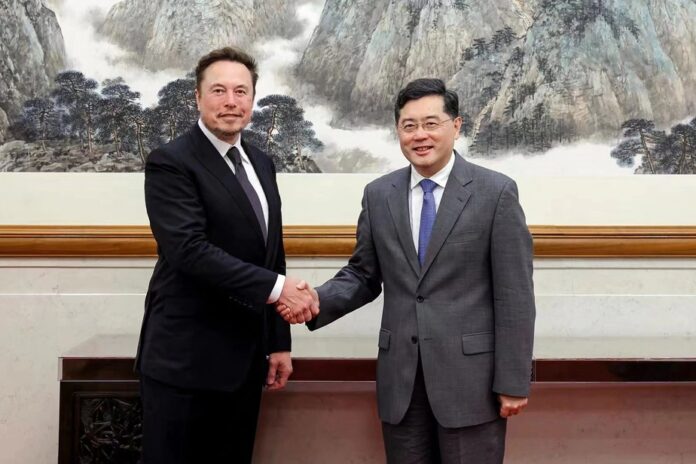(Beijing) The boss of the American electric car manufacturer Tesla, Elon Musk, hailed Wednesday in Beijing the “vitality” of Chinese development and said he had “full confidence” in this crucial market for his activity.
For his first visit to China in more than three years, the billionaire, also owner of the social network Twitter (inaccessible in the Asian country), was welcomed at almost the same level as a foreign political leader, with meetings with several members of the government.
Received by Foreign Minister Qin Gang on Tuesday, he confirmed his group’s wish to “continue to develop its activities in China”, according to Chinese diplomacy.
He added on Wednesday to Minister of Commerce Wang Wentao, with whom he “praised the vitality and development potential of China”, according to the ministry.
Elon Musk added “to have full confidence in the Chinese market” and said he was “willing to continue to deepen mutually beneficial cooperation”, the same source said.
Earlier in the day, he had met with Industry Minister Jin Zhuanglong.
The two men “exchanged views on the development of new energy vehicles and smart connected vehicles,” the ministry said in a statement.
Tesla representatives did not respond to AFP queries.
Sales of electric and hybrid cars doubled in China in 2022 and represent more than a quarter of vehicles sold, an unprecedented level, according to the Chinese Federation of Individual Car Manufacturers (CPCA). It is now the world’s largest market for electric vehicles.
Government support via subsidies, coupled with growing consumer interest, has enabled Chinese companies to dominate their domestic market.
While Tesla remains the world’s number one seller of electric cars, the popularity of Chinese brands is soaring.
Chinese manufacturer BYD, one of the most prominent local brands in this field, saw its net profit increase fivefold in 2022.
That of Tesla in the first quarter, however, fell significantly despite a significant increase in sales, due to a drop in prices.
The American manufacturer announced in April that it would set up a second battery mega-factory in Shanghai.
The factory will have an initial capacity of 10,000 Megapack batteries per year and is expected to start production “in the second quarter of 2024”, according to the China News Agency.
The site will become Tesla’s second factory in Shanghai after a large assembly site opened in 2019.
France, for its part, inaugurated on Tuesday the first factory producing batteries for electric cars on its soil in the north of the country, a key step towards a profound industrial metamorphosis aimed at catching up with Chinese manufacturers.
During his meeting with Qin Gang on Tuesday, Elon Musk said he was opposed to any economic “decoupling” between China and the United States, according to Chinese diplomacy.
“The interests of the United States and China are intertwined, like inseparable twins from each other,” he said according to the same source.
Same tone Wednesday during his exchange with the Minister of Commerce: “Relations between China and the United States are not a zero-sum game”, he told him, according to the ministry, before “thanking China for its support and guarantees given to the Tesla factory in Shanghai during the COVID-19 pandemic”.
The strong economic relationship between Elon Musk and China raises questions in Washington, where President Joe Biden said in November that his ties to foreign countries “deserve consideration”.
Elon Musk has also sparked controversy by suggesting that the island of Taiwan, claimed by Beijing, should be part of China.
Visits from international cadres who promote “better understanding of China” and “cooperation leading to mutual benefits” are welcome, Mao Ning, a spokeswoman for the Chinese Ministry of Foreign Affairs, said on Tuesday.















